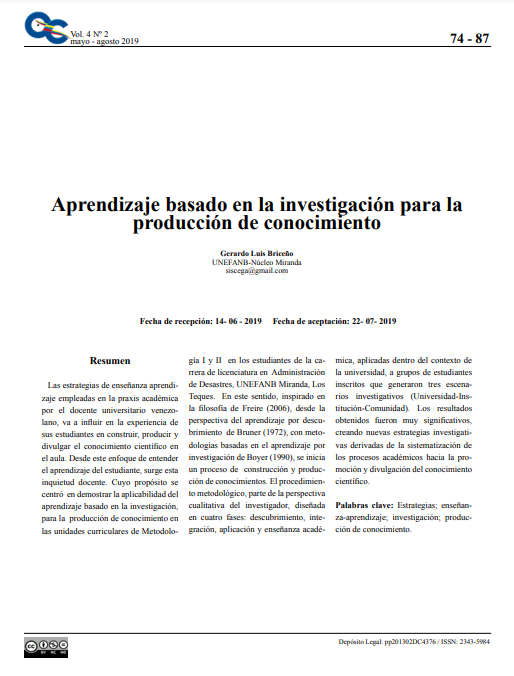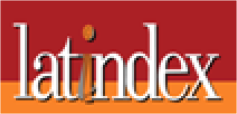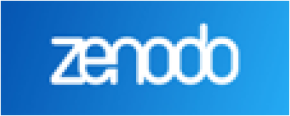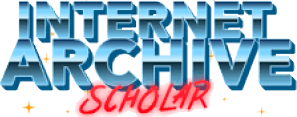Learning based on research for the production of knowledge
Keywords:
strategies, teaching-learning;, research, knowledge productionAbstract
The teaching-learning strategies used in the academic practice by the Venezuelan university teacher, will influence the experience of their students in building, producing and disseminating scientific knowledge in the classroom. From this approach of understanding student learning, this teaching concern arises. Whose purpose was focused on demonstrating the applicability of research-based learning, for the production of knowledge in the curricular units of Methodology I and II in the undergraduate students in Disaster Management, UNEFANB Miranda, Los Teques. In this sense, inspired by the philosophy of Freire (2006), from the perspective of learning by discovery of Bruner (1972), with methodologies based on research learning by Boyer (1990), a process of construction and production of knowledge. The methodological procedure, part of the qualitative perspective of the researcher, designed in four phases: discovery, integration, application and academic teaching, applied within the context of the university, to groups of registered students that generated three research scenarios (University-Institution-Community ). The results obtained were very significant, creating new research strategies derived from the systematization of academic processes towards the promotion and dissemination of scientific knowledge
Downloads
References
Ávila, F., Quintero, N; y Hernández, G. (2010). El uso de estrategias docentes para generar conocimientos en estudiantes de educación superior. Red de Revistas Científicas de América Latina y el Caribe, España y Portugal (redalyc.org).Año 16, No. 3, 2010, pp. 56 - 76
Barrón . C. (2015). Concepciones epistemológicas y práctica docente. Una revisión. Universidad Nacional Autónoma de México Vol. 13 (1), Enero-Abril 2015, 35-56 ISSN: 1887-4592 Fecha de recepción: 06-10-2014 Fecha de aceptación: 09-02-2015
Boyer, E. L. (1990). Scholarship Reconsidered: Priorities of the Professoriate. San Francisco: Jossey-Bass. Material on line revisado el 01-10-2018. Disponible http://sitios.itesm.mx/va/dide2/tecnicas_didacticas/abi/libros.htm
_________ (1997) Una propuesta para la educación superior del futuro. Trad. de Susana Fredín—México: FCE, UAM, 1997. 163 pp.; 21 x 14 cm, (Colec. Educación
Pedagogía)Bruner, J., (1972) El Proceso de educación, México: Ed. Uteha.
Ferrater, A. (1999), La programación del aprendizaje. Materia les AFFA. Barcelona. Fondo de Formación
Flores, C., E. (2015). El estudiante universitario en el Siglo XXI. Material On line https://drfloresup.com/2015/11/04/el-estudiante-universitario-en-el-siglo-xxi/. Enviado en noviembre 4, 2015. Visto el 31-03-18. Catedrático de la Universidad de Panamá
Freire, P. (2006). Pedagogía de la Autonomía. España Siglo veintiuno editores.
Gómez Ávalos, Giselle (2008). El uso de la Tecnología de la Información y la Comunicación y el Diseño Curricular. Revista Educación [En línea]. Disponible en: http://www.redalyc.org/articulo.oa?id=44032107 [Consulta 10/07/2013].
González, M. y Tourón, J. (1996). Autoconcepto de aprendizaje. Madrid – España. Texto, pp. 40-50
Ministerio del Poder Popular para la Educación Universitaria (2007). Proyecto Nacional De Universidad Politécnica. Documento presentado a las autoridades del Ministerio del Poder Popular para la Educación Superior y la Comisión Académica Nacional para su revisión y decisión Versión Preliminar. Colectivo Nacional De Los Institutos Y Colegios Universitarios De Venezuela
Ramos Romero, Graciela (2002). La sistematización como método teórico generalizador. Su significado en la investigación histórico-pedagógica. Artículo científico. Santiago de Cuba, recuperado en www.paulinia.sp.gov.br, 2002.

Downloads
Published
How to Cite
Issue
Section
License

This work is licensed under a Creative Commons Attribution-NoDerivatives 4.0 International License.







